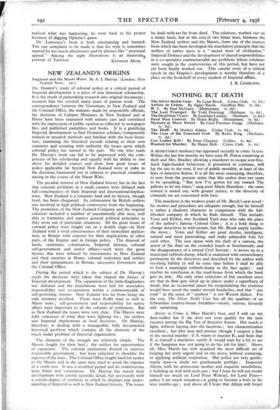NEW ZEALAND'S ORIGINS
England and the Maori Wars. By A. J. Harrop. (London : New Zealand News. 15s.)
DR. HARROP'S study of colonial policy at a critical period of Imperial development is a piece of true historical scholarship. It is the result of painstaking research into original documents ; research that has covered many years of patient work. - The correspondence between the Governors in New Zealand and the Colonial Office, the minutes made by responsible officials, the decisions of Cabinet Ministers in New Zealand and at Home have been examined with minute care and correlated with the expressions of public opinion as reflected in newspaper files and published pamphlets and books. It is a gratifying Imperial development to find Dominion scholars,scompetently trained in research methods and familiar with the local litera- ture, examining the historical records relating to their own countries and restating with authority the issues upon which colonial policy has turned in the past. No one who reads Dr. Harrop's book can fail to be impressed with the com- petence of his scholarship and equally with his ability to rise above his detailed sources and show how great issues of policy applicable far beyond New Zealand were at stake in the decisions hammered out in relation to practical situations arising in the course of the Maori Wars.
The peculiar interest of New Zealand history lies in the fact that concrete problems in a small country were debated with full consciousness of their Imperial and international implica- tions. New Zealand is a romantic land and its history, though brief, has been chequered. Its colonisation by British settlers was involved in high political controversy from the beginning. The promoters of the New Zealand Company and the original colonists included a number of uncommonly able men, well able to formulate and express general political principles as they arose out of particular situations. All the great issues of colonial policy were fought out on a double stage—in New Zealand with a vivid consciousness of their immediate applica- tion, in Britain with concern for their implications in other parts of the Empire and in foreign policy. The disposal of lands, systematic colonisation, Imperial defence, colonial self-government and native affairs—such were the great themes that were debated by missionaries in New Zealand and their societies at Home, colonial statesmen and settlers and their sympathisers in Britain, successive Governors and the Colonial Office.
During the period which is the subject of Dr. Harrop's study the decisions were taken that shaped the future of Imperial development. The separatism of the little-Englanders was defeated and the foundations were laid for associative responsibility and co-operation within a commonwealth of self-governing nations. New Zealand was far from being the only territory involved. There were Kaffir wars as well as Maori wars ; self-government and responsibility for native affairs were important to all the colonies of settlement. But in New Zealand the issues were very clear. The Maoris were fully conscious of what they were fighting for ; the settlers saw Imperial implications in local decisions. Dr. Harrop, therefore, is dealing with a manageable, fully documented historical problem which contains all the elements of the much wider problem of Imperial organisation.
The elements of the struggle are relatively simple. The Maoris fought for their land ; the settlers for opportunities of expansion. The colonial parliament desired to exercise responsible government ; but were reluctant to shoulder the expense of the wars. The Colonial Office fought hard for justice to the Maoris and at the same time tried to avoid the expense of a costly war. It was a troubled period and its controversies were bitter and voluminous. Dr. Harrop has traced their development with careful scientific detail, but necessarily with a certain degree of synthesis in which he displays real under- standing of Imperial as well as New Zealand history. The issues he deals with are far from dead. The relations, worked out on a treaty basis, but at the cost of two bitter wars, between the New Zealand settlers and the Maoris, form one of the sources from which has been developed the mandatory principle that the welfare of native races is a "sacred trust of civilisation." Imperial Defence and the development of shared responsibilities in a co-operative commonwealth are problems whose solutions were sought in the controversies of this period, but have not yet been finally worked out. This careful story of a critical epoch in the Empire's development is worthy therefore of a place on the bookshelf of every student of Imperial affairs.
J. B. CONDLIFFE.














































 Previous page
Previous page